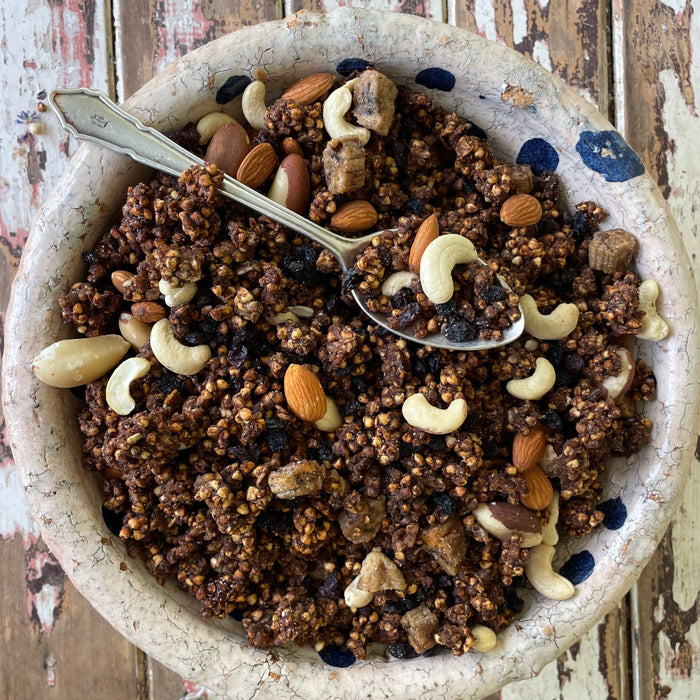Sprouted Buckwheat Granola


Almost 4 months have passed since the ravaging bushfires tore through Australia’s vast landscape. 12 million hectares were burnt, and sadly 1.25 billion of Australia’s native animals perished. But it was also heartwarming to see the true Australian spirit come to the fore with many volunteering time, money and resources to help those in need.
The road to recovery is still long, and while many towns rebuilding from the devastation and communities repairing from within, many of us have come to the point where we start asking “What more can we do to support this continuing recovery?”
Santos Organics have chosen to allocate 100% of our 2020 Grants funds to support bushfire recovery and rainforest protection (click HERE to read more about the projects we've chosen to support). If you feel compelled to show your support, there are still many ways we as everyday Australians can continue to support Australia’s bushfire recovery:
Support local businesses – Now more than ever, it is vitally important to support local businesses that have been affected by the bushfires. Check out ‘Spend with Them’ an Instagram page that connects you with businesses from fire-affected areas. Some of these include farms, wineries, clothing labels, surf shops and distilleries. And once the COVID-19 restrictions ease up, plan your holidays to fire-affected locations like the Blue Mountains, and while there shop in the local stores, camp at local campgrounds, stay in local hotels and motels, only fill up your car when you get there.
Australian wildlife recovery – There are many ways we can be involved in helping Australian wildlife recover from the losses experienced in the bushfires. Volunteering for, or donating to Australian wildlife charities comes at the top of this list. An example of a local wildlife charity is ‘Friends of the Koala’ who are dedicated to the rescuing, rehabilitating and releasing Koalas once their habitats are restored. Another way of supporting Australian wildlife recovery is through initiatives such as ‘Cans for Koalas’: Up until 23rd August 2020, ten cents from any can, plastic or glass bottle recycled at a nyTomra recycling centre in Australia can be donated to the WWF Australian Wildlife and Nature Recovery Fund.
Reforestation – Become part of the solution by donating to not for profit organisations such as ‘ReForest Australia’ who are focused on protecting natural ecosystems in Australian rainforests, protecting and expanding animals habitats and providing wildlife with permanent protection. Or other not for profit organisations such as ‘Rainforest Rescue’ whose mission it is to purchase, restore and protect rainforest habitats for Australian wildlife. You can also assist by planting more trees in your own local area, whether it be your backyard or community gardens.
Raise awareness – Scream the message from the rooftops. Remind your family, friends, co-workers, and community know of ways they can help with the continued bushfire recovery. Don’t let the importance of the recovery of Australias landscape be forgotten. Spread current information through social media platforms like Facebook, Twitter and Instagram. Making sure all information that is shared comes from trusted media outlets or social media accounts like the World Wildlife Foundation.
Prevention – One of the biggest things we can do is to try and make a shift, so this doesn’t happen again. But how do we do that? One of the main ways may be to follow traditional Australian Indigenous methods of regularly burning surface vegetation in the cooler months to create a natural firebreak. Countries such as Venezuela, Brazil, Canada and Botswana are already implementing these methods successfully. Perhaps it is time we rally or petition government bodies to do the same here.
When it comes to bushfire recovery and what we can do about it there are many options available to us. Choose the one that best suits you, but don’t let the environment and wildlife recovery be forgotten.
Megan Lee
megan.lee@scu.edu.au
Instagram & Facebook - @meganlovingmeagain
Twitter – MeganLeePhD